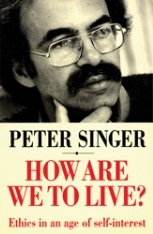How Are We to Live?
How Are We to Live? Ethics in an Age of Self-Interest is a book by the Australian philosopher Peter Singer, first published in 1993. The work delves into the question of how individuals should lead their lives in a world that is increasingly seen as focused on self-interest and material gain. Singer, a prominent ethicist known for his work in bioethics, animal rights, and effective altruism, argues for a reevaluation of our ethical commitments and suggests that living altruistically can lead to a more fulfilling and meaningful life.
Summary[edit | edit source]
In How Are We to Live?, Singer explores the concept of ethics and morality in the context of modern society's emphasis on self-interest. He critiques the dominant ethical paradigms that prioritize self-gain and material success, questioning the sustainability and ethicality of such approaches. Singer proposes an alternative view, suggesting that the principles of altruism and selflessness not only have the potential to solve many of the world's pressing problems but also offer individuals a more profound sense of satisfaction and purpose.
The book is divided into several chapters, each addressing different aspects of ethical living. Singer uses examples from history, literature, and personal anecdotes to illustrate his points, making the case that ethical living is not only possible but necessary for the betterment of society and the self.
Themes[edit | edit source]
The main themes of How Are We to Live? include:
- Altruism and Self-Interest: Singer examines the balance between self-interest and caring for others, advocating for a life led by altruistic values. - The Meaning of Life: The book explores how ethical living can provide answers to the age-old question of life's purpose. - Ethical Choices and Society: Singer discusses how individual ethical choices can impact society and contribute to a more equitable and compassionate world. - Practical Ethics: The work is a call to action, encouraging readers to apply ethical principles in their daily lives to effect positive change.
Reception[edit | edit source]
How Are We to Live? has been praised for its accessible approach to complex ethical issues and its persuasive argument for altruism as a guiding principle in life. Critics have noted Singer's engaging writing style and his ability to make philosophical concepts relevant to a general audience. However, some have challenged his views on the feasibility of widespread altruistic behavior in societies driven by competition and self-interest.
Legacy[edit | edit source]
The book has contributed significantly to discussions on ethics, particularly in the context of the modern world's challenges. It has influenced both academic and public discourse on how ethical considerations can guide personal and societal decisions. How Are We to Live? remains a key text in the study of practical ethics and has inspired individuals to reevaluate their lives in light of ethical principles.
See Also[edit | edit source]
- Ethics - Altruism - Peter Singer - Effective Altruism - Bioethics - Animal Rights
Search WikiMD
Ad.Tired of being Overweight? Try W8MD's physician weight loss program.
Semaglutide (Ozempic / Wegovy and Tirzepatide (Mounjaro / Zepbound) available.
Advertise on WikiMD
|
WikiMD's Wellness Encyclopedia |
| Let Food Be Thy Medicine Medicine Thy Food - Hippocrates |
Translate this page: - East Asian
中文,
日本,
한국어,
South Asian
हिन्दी,
தமிழ்,
తెలుగు,
Urdu,
ಕನ್ನಡ,
Southeast Asian
Indonesian,
Vietnamese,
Thai,
မြန်မာဘာသာ,
বাংলা
European
español,
Deutsch,
français,
Greek,
português do Brasil,
polski,
română,
русский,
Nederlands,
norsk,
svenska,
suomi,
Italian
Middle Eastern & African
عربى,
Turkish,
Persian,
Hebrew,
Afrikaans,
isiZulu,
Kiswahili,
Other
Bulgarian,
Hungarian,
Czech,
Swedish,
മലയാളം,
मराठी,
ਪੰਜਾਬੀ,
ગુજરાતી,
Portuguese,
Ukrainian
Medical Disclaimer: WikiMD is not a substitute for professional medical advice. The information on WikiMD is provided as an information resource only, may be incorrect, outdated or misleading, and is not to be used or relied on for any diagnostic or treatment purposes. Please consult your health care provider before making any healthcare decisions or for guidance about a specific medical condition. WikiMD expressly disclaims responsibility, and shall have no liability, for any damages, loss, injury, or liability whatsoever suffered as a result of your reliance on the information contained in this site. By visiting this site you agree to the foregoing terms and conditions, which may from time to time be changed or supplemented by WikiMD. If you do not agree to the foregoing terms and conditions, you should not enter or use this site. See full disclaimer.
Credits:Most images are courtesy of Wikimedia commons, and templates Wikipedia, licensed under CC BY SA or similar.
Contributors: Prab R. Tumpati, MD

